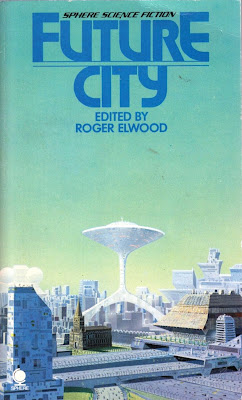Book Review: 'Future City' edited by Roger Elwood
4 / 5 Stars
‘Future City’ was originally published in 1973; in the US, a paperback edition was published in June, 1974, by Pocket Books, with a cover illustration by Michael Gross. The UK paperback edition (236 pp) was released in 1976 by Sphere Books, with a luminous cover illustration by Angus McKie.
Roger Elwood gained some degree of notoriety as a dedicated assembler and editor of large numbers of shoddy anthologies in the 70s, clearing a path for the late Martin Greenberg to launch his own career as Mega-Editor of more than 1200 anthologies.
But ‘Future City’ is reasonably good, particularly as an example of the Eco-catastrophe and Population Bomb themes prevalent in early 70s sf.
Clifford Simak and Frederik Pohl provide the Foreward and Afterward essays, respectively.
There are a few poems included in ‘Future City’: ‘In Praise of New York’ by Thomas Disch, ‘As A Drop’ by D. M. Price, and ‘Abendlandes’ by Virginia Kidd. None of them are particularly noteworthy.
My capsule summaries of the short-story contents:
‘The Sightseer’ by Ben Bova: short-short story of modern suburbanites visiting a domed New York City for illicit thrills. Bova expanded this story into his 1976 novel ‘City of Darkness’, which in turn was the spiritual precursor to the entire ‘Escape From New York’ genre of sf.
‘Meanwhile, We Eliminate’ by Andrew J. Offutt: Offutt uses capital letters in his surname in association with this tale, a sure sign that he was not employing Speculative Fiction Pretentiousness. A good story about Future City traffic run amok.
‘Thine Alabaster Cities Gleam’ by Laurence M. Janifer: an office tower’s HVAC system develops problems.
‘Culture Lock’ by Barry M. Malzburg: A rare, coherently plotted entry from Malzburg, who usually was besotted with the figurative prose of the New Wave movement. A very effective story of a Future City in which homosexual behavior – and participation in gay orgies (!) – is mandatory. Disturbing at the time of its publication, and still disturbing today.
‘The World As Will and Wallpaper’ by R. A. Lafferty: contrived entry, featuring prose designed to mimic that of the Speculative Fiction movement’s major inspiration, Thomas Pynchon. A young man searches Future City for clues to the Meaning of Life.
‘Violation’ by William F. Nolan: moving violations on Future City’s streets.
‘City Lights, City Nights’ by K. M. O’Donnell: underwhelming tale of an arrogant young director whose low-budget film production recruits city residents.
‘The Undercity’ by Dean R. Koontz: clever tale of Wiseguys operating in Future City.
‘Apartment Hunting’ by Harvey and Audrey Bilker: nicely written tale in which a couple make a harried application for living space in the overpopulated Future City.
‘The Weariest River’ by Thomas N. Scortia: immortality loses its appeal when you live in a dystopian Future City. Not the most accessible story, but one with a gritty, proto-Cyberpunk sensibility to it.
‘Death of A City’ by Frank Herbert: two city planners have a metaphysical debate. The worst entry in the anthology.
‘Assassins of Air’ by George Zebrowski: Horatio Alger meets a polluted metropolis.
‘Getting Across’ by Robert Silverberg: reasonably entertaining novelette about a man confronting the breakdown of his section of the global mega-city. As always with Silverberg’s fiction of this period, essentially a story about Relationships, rather than a hardcore sf tale per se.
‘In Dark Places’ by Joe L. Hensley: gritty, grim tale of racial warfare in a decrepit Future City. Another of the best stories in the anthology, also exhibiting an offbeat, proto-Cyberpunk sensibility.
‘Revolution’ by Robin Schaeffer: a confusing allegory about robots and their human charges.
‘Chicago’ by Thomas F. Monteleone: the future metropolis is completely automated; a robot questions why.
‘The Most Primitive’ by Ray Russell: short-short tale, cleverly assembled.
‘Hindsight: 480 Seconds’ by Harlan Ellison: obligatory entry from Ellison. The last days of future city, with added pathos. Pedestrian.
‘5,000,000 AD’ by Miriam Allen deFord: mordant tale of man’s last days.
In summary, 'Future City' is one of the better Elwood anthologies, and a good snapshot of where the genre stood in in 1973 in terms of depicting future dystopias. Worth searching out.


Absolutely love your blog. Thank you so much for sharing your wonderful books with us.
ReplyDelete